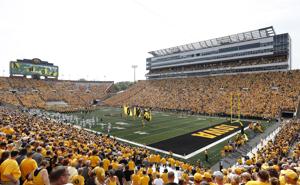Gambling’s place in campus culture portends scandals to come

With the proliferation of legal wagering in the United States the past five years, it wasn’t a question of if but when a college sports gambling scandal would become public.
Two have come to light in the past week, the first at Alabama involving its head baseball coach and then an investigation of Iowa and Iowa State athletes participating in online gambling.
“This is probably just the tip of the iceberg,” Keith Whyte, executive director of the National Council on Problem Gambling, said Tuesday. “In surveys, the athletes self-report a high rate of gambling participation and sports betting. It wouldn’t surprise us if there’s more problems that surface.”
East Carolina assistant professor Michelle L. Malkin, who researches ties between gambling and criminality, said placing sports bets has become a part of college culture, more so since the U.S. Supreme Court in 2018 cleared the way for states to legalize sports wagering.
People are also reading…
“We can’t think our student-athletes would be acting any different than their friends and peers who are engaged in similar activity that’s been normalized through this mass expansion of legalized gambling,” Malkin said.
NCAA rules prohibit athletes, coaches and staff from betting on sports in which the NCAA conducts a championship. For example, athletes aren’t allowed to bet on NFL games even if state laws would legally allow them to do so. It is illegal for a person under 21 to wager on sports in Iowa and most of the other 32 states where legal sportsbooks are now operating.
The most recent NCAA study on college wagering, in 2016, found that 24% of male athletes reported violating NCAA rules within the previous year by wagering on sports for money; 9% reported they had bet on sports at least once a month. About 5% of female athletes reported wagering on sports in the previous year.
The NCAA had planned to conduct a study of athlete gambling habits in 2020, but it was suspended due to the pandemic, spokeswoman Michelle Hosick wrote in an email to The Associated Press.
“Understanding the impact that the gaming industry’s multi-billion dollar ad campaigns may have on student-athletes is a top priority for the NCAA,” she said. Hosick said new NCAA president Charlie Baker has requested a new survey be done as soon as possible.
Whyte and Malkin both said anecdotal evidence suggests the rate of gambling by college athletes is much higher than the one-in-four reported in 2016.
Whyte said it’s common for teenage boys to tell him they have apps on their phones for daily fantasy sports games or offshore sportsbook accounts where age verification is easy to get around.
“When they say they’re betting sports, it doesn’t always mean they’re betting with a legal, regulated operator,” Whyte said.
EPIC Risk Management, based in the United Kingdom, began a five-year contract with the NCAA last year to provide what was described as a “customized sports wagering gambling harm prevention program.” The NCAA said more than 10,000 athletes and administrators attended in-person programming last year.
What triggered the investigations at Iowa and Iowa State has not been disclosed.
The Hawkeyes said 26 athletes across five sports are suspected of wagering on sports in violation of NCAA rules and more than 100 people have been linked to the investigation. Iowa State, meanwhile, said that some 15 of its athletes across three sports also are suspected of violating gambling rules.
The Iowa Division of Criminal Investigation is the lead agency, and a spokesperson said no charges have been filed. Brian Ohorilko, director of gaming for the Iowa Racing and Gaming Commission, told The Associated Press he knows of no evidence indicating match fixing or suspicious wagering activity on Iowa or Iowa State games.
Last week, Alabama fired its baseball coach, Brad Bohannon, following a report of suspicious bets made at an Ohio casino on a game involving his team.
College sports administrators say many athletes have more disposable income than ever because of endorsements-for-pay opportunities for use of their name, image or likeness, cost-of-attendance payments and academic achievement awards of up to almost $6,000 per year.
Malkin said athletic departments entering partnerships with gambling operators has been one of the most disturbing developments. Michigan State, LSU and Maryland are among the schools that have entered agreements paying them millions of dollars.
The American Gaming Association, the national trade group representing the U.S. casino industry, last month updated its Responsible Marketing Code for Sports Wagering to prohibit college partnerships that promote, market or advertise sports wagering as well as sportsbook NIL deals with college athletes.
“The industry should not have a place on college campuses, mostly because the vast majority of students are under the age of 21,” Malkin said. “You are promoting this behavior that is most likely unlawful. I understand why those partnerships exist. Money means something and alumni are at an age they would bet on their teams. I do not think college campuses are the right place for those partnerships.”
For more latest Sports News Click Here

